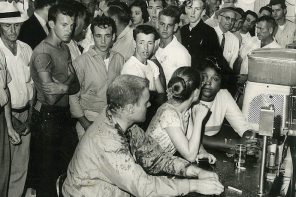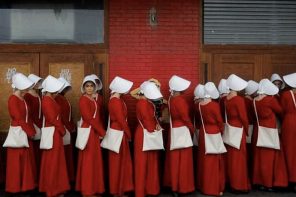It is impossible to deny the significance of what citizens of the United States achieved on November 4 with unquestionable clarity. We, as a nation, have moved that much closer to re-envisioning the nature and meaning of our democratic ideals in ways that prioritize our values, our ethical commitments, over against the look of our bodies. In this sense, we have made important strides towards living the best of our principles by pushing toward confrontation with an embarrassing past marked by exclusion.
We must recognize, however, that oppression is weblike in nature, a series of interrelated modalities of exclusion. We cannot allow this victory to blind us to the ongoing forms of discrimination. Voters on November 4 called for new ways of doing things, new understandings of our diversity as creative possibility. This points in the direction of our potential for transformative actions. But, as religious scholar Reinhold Niebhur reminded his contemporaries during the twentieth century, humans are also prone to great evil: Our transformation of life options in sustained ways—a prolonged push to the good, achieved in light of the best of our deep commitments—is a delicate operation destroyed so very easily.
We do extreme damage if we assume the election of Barack Obama marks the end of struggle. No, it places our country on the edge of a promise. It is an opportunity uncovered, not an opportunity fulfilled. This statement is not meant to take away from the historic nature of the achievement we have made for ourselves, and the world. Rather, it is meant to suggest the need for a measured realism—recognition that this does not signal the death knell of racism, sexism, classism, homophobia, and the other modalities of injustice that have infected our nation.
Instead, those millions of votes for Obama pointed out determination to foster change, to enhance life options, to re-imagine the nature and look of life in these United States. What is interesting is the manner in which Obama points to the failure of race politics as the shape of this re-imagining. Oppression remains a target of attack, but racial discrimination is placed within a larger context and subordinated to a more fundamental call for change. It is a twenty-first century return to Martin L. King Jr.’s call for the “content of character” as the final marker of our being.
As scholars remind us, the “reading” of bodies in ways that support white supremacy marks much of our history. Through what Cornel West references as the “normative gaze,” white bodies were “read” or viewed as beautiful, markers of intellect and ability; while black, brown, and red bodies were viewed as being of less importance, less beautiful, and therefore available for the benefit of white Americans. The election cracks this process, exposes its flaws, and just might encourage a different take on bodies once despised. Black bodies, bodies like Obama’s, can no longer be so easily assumed dangerous, odd, or “other” in a negative manner.
And so, the election of Obama does not simply signal a response to economic crisis. There is something more fundamental taking place, a desire to re-imagine ourselves, to reshape ourselves on a economic and political level. But more importantly, on the level of our basic purpose as a people, on the level of concerns and commitments that shape us existentially and ontologically–its a desire to shape ourselves in terms of our historical existence and the nature and meaning of our very being.
The promise marked by this election, if we embrace it, will shake us to our foundation and force us to be more than we have been, to live in light of our higher ideals. This hopefulness, however, must be tempered in that it is all too easy to return to the easy patterns of life, the old and worn markers of interaction as conflict. Perhaps the election of Obama in years to come will encourage children to see expansive possibilities for themselves; but only hard work can provide the opportunity for achieving those dreams.
What we achieved on November 4 marks an appreciation for those who have struggled for the best of this country’s potential; it is an embrace of their hope and a commitment to the legacy of their struggle. This shift in our politics required recognition of “change” as necessary and as a fundamental part of what is best about our democratic ideals. It required something of a leap of faith by supporting a relatively new political figure, and it required a willingness to avoid the easy political rhetoric, and demand more of our nation. But there is more ahead of us. We have not fully recognized and exorcised the worst of our inclinations and patterns of behavior. We have not embraced in full the problems we must address, the problems we have created. That type of awakening and praxis entails more than the casting of a vote.




